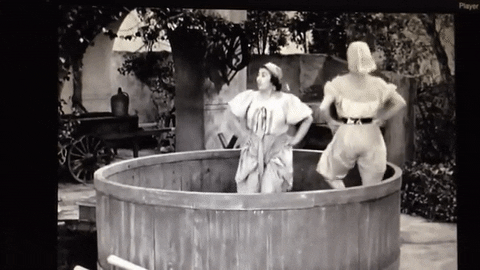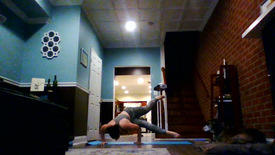Raisin Wine
MIltonBradley1
Posts: 688 Member
Every stop to think why they don't make wine out of raisins? I mean, its from a grape so why not? Just take a bunch of raisins and run them through a press.
1
Replies
-
Actually, it is possible to make wine from raisins. Although they need to be boiled first.2
-
This content has been removed.
-
Because....all you need for fermentation is water and sugar. Fermentation is an anaerobic process.0
-
-
Because....all you need for fermentation is water and sugar. Fermentation is an anaerobic process.
Fermentation requires oxygen, thus aerobic.
Raisins are dried grapes, you would need to add water to release the sugar so that you can ferment it. Boiling helps release the sugar into the boiling water so that when yeast is added it can ferment.1 -
rileysowner wrote: »Because....all you need for fermentation is water and sugar. Fermentation is an anaerobic process.
Fermentation requires oxygen, thus aerobic.
Raisins are dried grapes, you would need to add water to release the sugar so that you can ferment it. Boiling helps release the sugar into the boiling water so that when yeast is added it can ferment.
Exactly! This guy knows what he’s talking about.0 -
rfitnessmfplulz wrote: »
Actually, I think dehydration is what caused it.1 -
There is also a lot less juice left in raisins, so that means you would need so many more grapes (raisins) to make one bottle of wine0
-
-
This sounds so gross!0
-
laprimaJenny wrote: »rileysowner wrote: »Because....all you need for fermentation is water and sugar. Fermentation is an anaerobic process.
Fermentation requires oxygen, thus aerobic.
Raisins are dried grapes, you would need to add water to release the sugar so that you can ferment it. Boiling helps release the sugar into the boiling water so that when yeast is added it can ferment.
Exactly! This guy knows what he’s talking about.
Except that he is wrong and fermentation is not an aerobic process. If you have ever made sauerkraut or other fermented vegetables you would know that you have to keep them submerged away from O2 or they rot.
Look it up.
0 -
This content has been removed.
-
A grape is a grape of course, but the reason grapes rather than dried grapes are used for wine is the water content of grape is a free resource.0
-
laprimaJenny wrote: »rileysowner wrote: »Because....all you need for fermentation is water and sugar. Fermentation is an anaerobic process.
Fermentation requires oxygen, thus aerobic.
Raisins are dried grapes, you would need to add water to release the sugar so that you can ferment it. Boiling helps release the sugar into the boiling water so that when yeast is added it can ferment.
Exactly! This guy knows what he’s talking about.
Except that he is wrong and fermentation is not an aerobic process. If you have ever made sauerkraut or other fermented vegetables you would know that you have to keep them submerged away from O2 or they rot.
Look it up.
Well then, you are right about fermentation generally speaking. Although the process of making wine actually has two distinct stages known as primary and secondary, aka aerobic and anaerobic fermentations. That is why it is important that you do not use an air-lock container during the first few days of fermentation, which allows the juice to be open to the air. Then the wine is transferred to a secondary fermentor when fermentation is nearly complete. Once fermentation is on the decline, the wine must be placed in a more air-tight environment to keep it safe.
0 -
laprimaJenny wrote: »laprimaJenny wrote: »rileysowner wrote: »Because....all you need for fermentation is water and sugar. Fermentation is an anaerobic process.
Fermentation requires oxygen, thus aerobic.
Raisins are dried grapes, you would need to add water to release the sugar so that you can ferment it. Boiling helps release the sugar into the boiling water so that when yeast is added it can ferment.
Exactly! This guy knows what he’s talking about.
Except that he is wrong and fermentation is not an aerobic process. If you have ever made sauerkraut or other fermented vegetables you would know that you have to keep them submerged away from O2 or they rot.
Look it up.
Well then, you are right about fermentation generally speaking. Although the process of making wine actually has two distinct stages known as primary and secondary, aka aerobic and anaerobic fermentations. That is why it is important that you do not use an air-lock container during the first few days of fermentation, which allows the juice to be open to the air. Then the wine is transferred to a secondary fermentor when fermentation is nearly complete. Once fermentation is on the decline, the wine must be placed in a more air-tight environment to keep it safe.
No, there is no such thing as aerobic fermentation. The airlock is because of the gases generated by fermentation will blow your container open, and the airlock keeps outside air out. The chemistry is pretty simple. We made "wine" in a fermentation lab in Bio 101. You can even look it up.0 -
Not exactly raisins, but many sweeter wines, such as sauternes and reislings, are actually made from grapes which have begun to shrivel.
https://www.winemag.com/2017/09/08/the-beautiful-bounty-of-botrytized-wines/1 -
laprimaJenny wrote: »laprimaJenny wrote: »rileysowner wrote: »Because....all you need for fermentation is water and sugar. Fermentation is an anaerobic process.
Fermentation requires oxygen, thus aerobic.
Raisins are dried grapes, you would need to add water to release the sugar so that you can ferment it. Boiling helps release the sugar into the boiling water so that when yeast is added it can ferment.
Exactly! This guy knows what he’s talking about.
Except that he is wrong and fermentation is not an aerobic process. If you have ever made sauerkraut or other fermented vegetables you would know that you have to keep them submerged away from O2 or they rot.
Look it up.
Well then, you are right about fermentation generally speaking. Although the process of making wine actually has two distinct stages known as primary and secondary, aka aerobic and anaerobic fermentations. That is why it is important that you do not use an air-lock container during the first few days of fermentation, which allows the juice to be open to the air. Then the wine is transferred to a secondary fermentor when fermentation is nearly complete. Once fermentation is on the decline, the wine must be placed in a more air-tight environment to keep it safe.
No, there is no such thing as aerobic fermentation. The airlock is because of the gases generated by fermentation will blow your container open, and the airlock keeps outside air out. The chemistry is pretty simple. We made "wine" in a fermentation lab in Bio 101.
Well I sure didn’t learn that in Bio 101, but one thing I know for sure is that I come from a family that has been making wine for many generations. I was always told that the primary fermentation is actually for the release of minimal amounts of oxygen to be introduced during the lag phase of fermentation, in which reproduction is mostly concentrated. Hence, there is oxygen slowly released into the containers. Some people call it aerobic fermentation, technically speaking it should be called the reproduction phase. Regardless of what it’s called though, oxygen is indeed present.
The idea that you need to take the oxygen away to produce good wine seems counter-productive to me. It seems to run counter to the growing return of the barrique/amphora method of winemaking throughout many European countries, which use containers that allow more than average amounts of oxygen exposure during fermentation. To top it off these wines are remarkably mineral-rich wines, intensely aromatic, and certainly there is nothing wrong with the way they taste and even with long term-aging. Then again, it’s merely my uneducated opinion.0 -
I didn't say there wasn't o2 present as it is hard to have an oxygen free environment. I was saying it isn't part of the fermentation process which from my understanding predates free oxygen in the atmosphere. Fermentation does not release oxygen. Fermentation releases carbon dioxide. That is the chemistry.
Not sure what is meant by lag and reproduction phase. But yeast reproduces without oxygen and in the lag phase if a gas is being reintroduced it would more likely be carbon dioxide.
This article has a good explanation https://en.wikipedia.org/wiki/Fermentation0 -
This content has been removed.
-

I thought this was how wine is made.
2 -
@aChuisle_moChroi wrote: »

I thought this was how wine is made.
I think to stomp on raisins you have to let your feet soak in water until they get all pruny looking, like raisins.1 -
aChuisle_moChroi wrote: »

I thought this was how wine is made.
I’ve seen it done this way, but I can’t get passed the fact that someone may have warts on their feet.1 -
This content has been removed.
-
rfitnessmfplulz wrote: »
Thank you for making me laugh out loud.0 -
aChuisle_moChroi wrote: »

I thought this was how wine is made.
This show = genius...one of my favorite episodes.1 -
laprimaJenny wrote: »laprimaJenny wrote: »rileysowner wrote: »Because....all you need for fermentation is water and sugar. Fermentation is an anaerobic process.
Fermentation requires oxygen, thus aerobic.
Raisins are dried grapes, you would need to add water to release the sugar so that you can ferment it. Boiling helps release the sugar into the boiling water so that when yeast is added it can ferment.
Exactly! This guy knows what he’s talking about.
Except that he is wrong and fermentation is not an aerobic process. If you have ever made sauerkraut or other fermented vegetables you would know that you have to keep them submerged away from O2 or they rot.
Look it up.
Well then, you are right about fermentation generally speaking. Although the process of making wine actually has two distinct stages known as primary and secondary, aka aerobic and anaerobic fermentations. That is why it is important that you do not use an air-lock container during the first few days of fermentation, which allows the juice to be open to the air. Then the wine is transferred to a secondary fermentor when fermentation is nearly complete. Once fermentation is on the decline, the wine must be placed in a more air-tight environment to keep it safe.
I like this lady. Can we be besties.1 -
This content has been removed.
This discussion has been closed.
Categories
- All Categories
- 1.4M Health, Wellness and Goals
- 397K Introduce Yourself
- 44.2K Getting Started
- 260.9K Health and Weight Loss
- 176.3K Food and Nutrition
- 47.6K Recipes
- 232.8K Fitness and Exercise
- 456 Sleep, Mindfulness and Overall Wellness
- 6.5K Goal: Maintaining Weight
- 8.7K Goal: Gaining Weight and Body Building
- 153.3K Motivation and Support
- 8.3K Challenges
- 1.3K Debate Club
- 96.5K Chit-Chat
- 2.6K Fun and Games
- 4.5K MyFitnessPal Information
- 16 News and Announcements
- 18 MyFitnessPal Academy
- 1.4K Feature Suggestions and Ideas
- 3.1K MyFitnessPal Tech Support Questions










